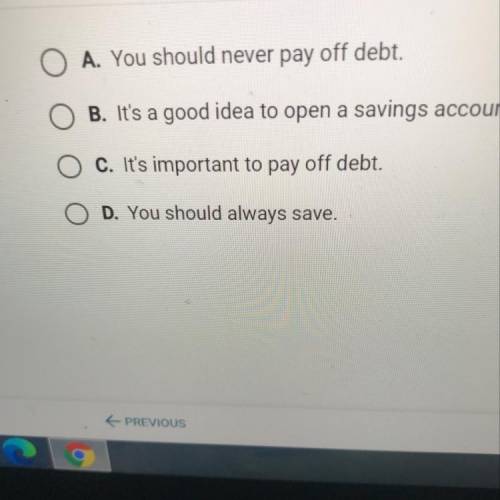Pay It On:
Let's say you have $1,000 in savings and are making 6
percent interest. That means...

English, 04.11.2020 18:30 shayneseaton
Pay It On:
Let's say you have $1,000 in savings and are making 6
percent interest. That means that you make $60 a month
in interest. Let's also say that you have $500 you need to
pay off on your credit card. By not paying it off, they charge
you 18 percent interest a month. That means you owe an
extra 990 a month. It's just foolish to keep putting money
in a savings account when you have credit cards to pay off.
You'll save money if you pay off the credit cards and then
start saving
Save It!
I don't know why people don't try to save more. Now, it's
smart to go ahead and work on paying off any debt you
currently have on credit cards. But it's even better to stop
using your credit cards! Instead of constantly buying
things on credit cards, put your money in a savings
account and wait until you have the cash to buy what you
want. That way you won't end up losing all your money to
credit card debt! Try to stop spending and start saving.
What is a common main idea from both of these texts?


Answers: 2


Another question on English

English, 21.06.2019 20:50
It is important to learn about finances. take, for instance, the old rule of saving ten percent of every paycheck. are most people aware that theyshould immediately take that percentage out of their paycheck and put it into savings? balancing your checkbook is another important element ofkeeping track of your money. buy a money tracking program and use it to manage your money. another important tip is to speak with a financialplanner and learn about stocks and bonds. come up with a savings plan that includes a 401k, stocks, and bonds. and start young. the longer youwait to save, the less compound interest you will accumulate.which is the best title for this paragraph?
Answers: 1

English, 21.06.2019 23:30
1. at the conclusion of chapter 13, the monster realizes that he has none of the qualities or possessions that human beings value, and so he worries the he will be forever miserable. he says, “oh, that i had for ever remained in my native wood, nor known nor felt beyond the sensations of hunger, thirst, and heat! ” this statement recalls one made by victor frankenstein in chapter 10: “if our impulses were confined to hunger, thirst, and desire, we might nearly be free; but now we are moved by every wind that blows, and a chance word or scene that that word may convey to us.” questions: what do these two statements suggest about the impact of knowledge? how do the statements affect the way readers view the monster and victor?
Answers: 1

English, 22.06.2019 00:30
20 points and brainliest if correct the speaker of "when i have fears" sometimes feels that love and fame are "nothingness." based on both sonnets, what values do you think keats holds to be the highest in life? in a short paragraph, support your claim with evidence from the poems' contents, tone, and style. include imagery and figures of speech.
Answers: 3

English, 22.06.2019 11:00
Instructions: the following argument argues for advertising to children. read the argument and answer the question that follows: topic and question advertising: should companies be allowed to advertise to children? ineffective argument i think that advertising to children is necessary. how else will we know what we can buy? i think that children are not aware of the products that are available. most children don’t own cars and can’t drive to stores to look around. the only way we know what we can buy is by seeing advertisements on tv. my friend really likes advertisements, too. he said, "how will we know what to buy if we don’t see advertisements? " seriously, children are consumers, too. we know what we like and we ask our parents to buy these products for us. i know that i like certain cereals, but how would i know that if i did not see advertisements? i love those commercials! kids are people, too. why is the argument ineffective? in a paragraph of 7–10 complete sentences, explain why the following parts of the argument are ineffective, and how they can be improved: claim support conclusion clincher point of view transitions
Answers: 1
You know the right answer?
Questions


Mathematics, 11.10.2021 02:20

Mathematics, 11.10.2021 02:20

World Languages, 11.10.2021 02:20

Chemistry, 11.10.2021 02:20

Mathematics, 11.10.2021 02:20


Chemistry, 11.10.2021 02:20

Mathematics, 11.10.2021 02:20



Mathematics, 11.10.2021 02:20

Computers and Technology, 11.10.2021 02:20

Chemistry, 11.10.2021 02:20


Mathematics, 11.10.2021 02:20


Mathematics, 11.10.2021 02:20

Social Studies, 11.10.2021 02:20

Mathematics, 11.10.2021 02:20



